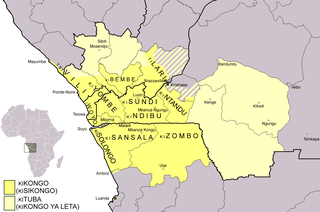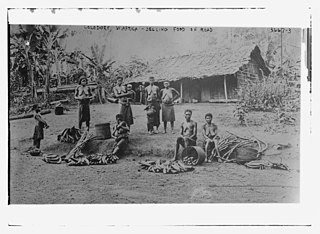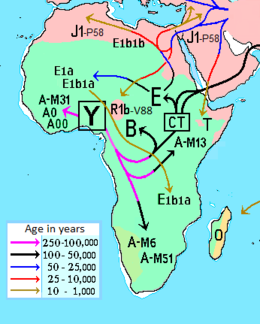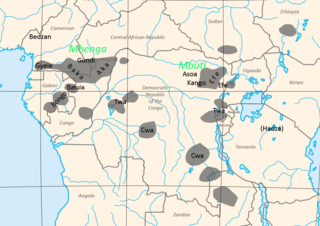
Jacob Ludwig Karl Grimm, also known as Ludwig Karl, was a German author, linguist, philologist, jurist, and folklorist. He is known as the discoverer of Grimm's law of linguistics, the co-author of the monumental Deutsches Wörterbuch, the author of Deutsche Mythologie, and the editor of Grimms' Fairy Tales. He was the older brother of Wilhelm Grimm, of the literary duo the Brothers Grimm.

In anthropology, pygmy peoples are ethnic groups whose average height is unusually short. The term pygmyism is used to describe the phenotype of endemic short stature for populations in which adult men are on average less than 150 cm tall.

Kongo or Kikongo is one of the Bantu languages spoken by the Kongo people living in the Democratic Republic of the Congo, the Republic of the Congo, Angola and Gabon. It is a tonal language. It was spoken by many of those who were taken from the region and sold as slaves in the Americas. For this reason, while Kongo still is spoken in the above-mentioned countries, creolized forms of the language are found in ritual speech of Afro-American religions, especially in Brazil, Cuba, Puerto Rico, the Dominican Republic and Haiti. It is also one of the sources of the Gullah language and the Palenquero creole in Colombia. The vast majority of present-day speakers live in Africa. There are roughly seven million native speakers of Kongo, with perhaps two million more who use it as a second language.

The Mbuti people, or Bambuti, are one of several indigenous pygmy groups in the Congo region of Africa. Their languages are Central Sudanic languages and Bantu languages.

The Aka or Bayaka are a nomadic Mbenga pygmy people. They live in southwestern Central African Republic and in northern Republic of the Congo. They are related to the Baka people of Cameroon, Gabon, northern Congo, and southwestern Central African Republic.

The Baka people, known in the Congo as Bayaka, are an ethnic group inhabiting the southeastern rain forests of Cameroon, northern Republic of the Congo, northern Gabon, and southwestern Central African Republic. They are sometimes called a subgroup of the Twa, but the two peoples are not closely related. Likewise, the name "Baka" is sometimes mistakenly applied to other peoples of the area who, like the Baka and Twa, have been historically called pygmies, a term that is no longer considered respectful.

Lolodorf is a small town-centred region in the south province of the Republic of Cameroon, near the western coast of Africa. It is between Ngoumou and Bipindi, in a zone of the Atlantic Littoral Evergreen Forest.

Haplogroup B (M60) is a human Y-chromosome DNA haplogroup common to paternal lineages in Africa. It is a primary branch of the haplogroup BT.
The Bongo people, also called Babongo or Bazimba, are an agricultural people of Gabon in equatorial Africa who are known as "forest people" due to their recent foraging economy.
Aka, also known as Yaka or Beka, is a Bantu language spoken in the Central African Republic and Republic of Congo, along the Ubangi River dividing the two countries.

The Kwasio language, also known as Ngumba / Mvumbo, Bujeba, and Gyele / Kola, is a language of Cameroon, spoken in the south along the coast and at the border with Equatorial Guinea by some 70,000 members of the Ngumba, Kwasio, Gyele and Mabi peoples. Many authors view Kwasio and the Gyele/Kola language as distinct. In the Ethnologue, the languages therefore receive different codes: Kwasio has the ISO 639-3 code nmg, while Gyele has the code gyi. The Kwasio, Ngumba, and Mabi are village farmers; the Gyele are nomadic Pygmy hunter-gatherers living in the rain forest.
Baka is a dialect cluster of Ubangian languages spoken by the Baka Pygmies of Cameroon and Gabon. The people are ethnically close to the Aka, the two together called the Mbenga (Bambenga), but the languages are not related, apart from some vocabulary dealing with the forest economy, which suggests the Aka may have shifted to Bantu, probably 15000 people have shifted.
The Kola people, Bakola, also known as the Koya, Bakoya, are pygmies of the NE Gabon–Congo border area. They speak the Bantu Ngom language.

The Congo Pygmies are those "forest people" who have, or recently had, a hunter-gatherer economy and a simple, non-hierarchical societal structure based on bands, are of short stature, have a deep cultural and religious affinity with the Congo forest and live in a generally subservient relationship with agricultural "patrons", with which they trade forest products such as meat and honey for agricultural and iron products.

The Twa are a group of indigenous African Pygmy tribes.
Kele is a Bantu language of Gabon. Dialects of the Kele language are scattered throughout Gabon.

The African Pygmies are a group of ethnicities native to Central Africa, mostly the Congo Basin, traditionally subsisting on a forager and hunter-gatherer lifestyle. They are divided into three roughly geographic groups:
The Bakoya are pygmies, earlier known as Négrilles or Babinga, who inhabitant the rainforest between Cameroon and the Great Lake region of the Congo Basin in Central Africa. Since the 1930s, the Bakoya, in particular, have settled in Gabon in the Ogooue-Ivindo Province, in the northeastern region of the country. Similar minority groups are the Babongo and the Baka pygmies. Before they adapted to the agricultural practices in the new settlements in Gabon along the flanks of the road, Bakoya were “semi-nomadic hunter-gatherers” like the other forest-dwelling pygmies; they resided in small huts. The word 'Pygmee' is a French coinage, adopted by the Gabonese. They are the earliest inhabitants of the forest and are nomadic hunter gatherers.












